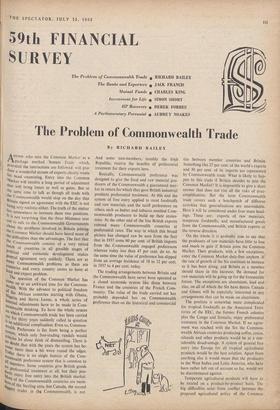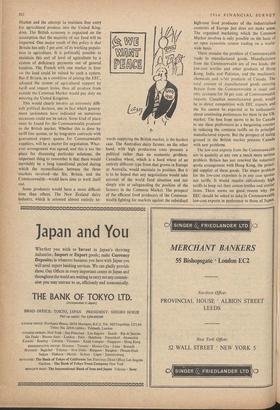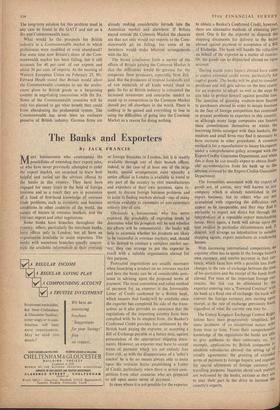59th FINANCIAL SURVEY
The Problem of Commonwealth Trade The Ranks and Exporters Mutual Funds Investment for .1.41e HP Recovers A Parliamentary Perennial • RICHARD BAILEY a JACK FRANCIS • CHARLES KING • SIMON SHORT • DEREK FORBES • AUBRE Y NOAKES
The Problem of Commonwealth Trade
By RICHARD BAILEY A NvoNE who sees the Common Market as a package marked 'Instant Trade which, provided the instructions are followed will pro- duce a wonderful stream of exports clearly wants his head examining. Entry into the Common Market will involve a long period of adjustment that will bring losses as well as gains. But at the same time to talk as though all trade with the Commonwealth would stop on the day that ilritain signed an agreement with the EEC is not ,being very realistic either. The truth of the matter nes somewhere in between these two positions. It is not "surprising that the three Ministers sent "tit to talk to the Commonwealth Governments about the problems involved in Britain joining the Common Market should have heard more of the difficulties than the advantages. The fact that the Commonwealth consists of a very mixed batch of countries in all possible stages of Political and economic development makes general agreement very unlikely. There are as illany Commonwealth problems as there are ,ebuntries and every country seems to have at least one export problem. r, The question of the Common Market has at an awkward time for the Common- "ealth. With the advance to political freedom (1)%f. the African countries starting with Ghana, i„igerin and Sierra Leone, a whole series of :ternal adjustments have to be made in Com- "tunWealth thinking. To have the whole system uon Which Commonwealth trade has been carried ut for thirty years suddenly called in question ws an additional complication. Even so, Common- s eahh Preference is far from being a perfect !?teM, which only free-trading vandals would `41ttcise let alone think of dismantling. There is en° doubt that with the years the system has be- ,1.°111e more than a bit worn round the edges. mucky there is no single feature of the Com- spenwealth preference system that is common to Members. Some countries give British goods "e ci preferential treatment at all, but their pro- SS enjoy free entry into the British market. be"st Of the Commonwealth countries are mem- of the Sterling area, but Canada, the second ggest trader in thg Commonwealth, is not. And some non-members, notably the Irish Republic, receive the benefits of preferential treatment for their exports here.
Basically, Commonwealth preference was designed to give the food and raw material pro- ducers of the Commonwealth a guaranteed mar- ket in return for which they gave British industrial products preferential treatment. At this end the system of free entry applied to most foodstuffs and raw materials and the tariff preferences on others such as butter and tobacco enabled Com- monwealth producers to build up their econo- mies. At the other end of the line British exports entered many Commonwealth countries at preferential rates. The way in which this broad picture has changed can be seen from the fact that in 1937 some 60 per cent. of British imports from the Commonwealth engaged .preferences whereas today less than 47 per cent. do so. At the same time the value of preference has slipped from an average incidence of 10 to 12 per cent. in 1937 to 4 per cent. today.
The trading arrangements between Britain and the Commonwealth have never been operated as a closed economic system like those between France and the countries of the French Com- munity. The value of the trade carried out has probably depended less on Commonwealth preference than on the historical and commercial ties between member countries and Britain. Something like 25 per cent. of the world's exports and 30 per cent, of its imports are represented by Commonwealth trade. What is likely to hap- pen to this trade if Britain decides to join the Common Market? It is impossible to give a short answer that does not run all the risks of over- simplification. But the term Commonwealth trade covers such a hotchpotch of different activities that generalisations are unavoidable. Here it will be considered under four main head- ings. These are: exports of raw materials; temperate foodstuffs; and manufactured goods from the Commonwealth, and British exports in the reverse direction.
On the whole it is probably true to say that the producers of raw materials have little to lose and much to gain if Britain joins the Common Market. Their products, with a few exceptions, enter the Common Market duty-free anyhow. If the rate of growth of the Six continues to increase as it has been doing, and Britain as a member should share in this increase, the demand for raw materials will be going up for the foreseeable future. The exceptions are aluminium, lead and zinc, on all of which the Six have duties. Canada and Ghana will be especially interested in any arrangements that can be made on aluminium.
The position is somewhat more complicated for tropical foodstuffs as the Associated Terri- tories of the EEC, the former French colonies plus the Congo and Somalia, enjoy preferential treatment in the Common Market. If no agree. meat was reached with the Six the Common- wealth African countries producing coffee, cocoa, oilseeds and other products would be at a con- siderable disadvantage. A system of general free entry into Europe for all tropical agricultural products would be the best solution. Apart from anything else it would mean that the producers in the West Indies and Latin America, who have been rather left out of account so far, would not be discriminated against.
Temperate agricultural products will have to be treated on a product-by-product basis. The big difficulties arise from conflict between the proposed agricultural policy of the Common Market and the attempt to maintain free entry for agricultural produce into the United King- dom. The British economy is organised on the assumption that the majority of our food will be imported. One major result of this policy is that Britain has only 5 per cent. of its working popula- tion in agriculture. It is politically possible to maintain this sort of level of agriculture by a system of deficiency payments out of general taxation. The French with one worker in four on the land could be ruined by such a system. But if Britain, as a condition of joining the EEC, adopted the system of agricultural support by tariff and import levies, then all produce from outside the Common Market would pay duty on entering the United Kingdom.
This would clearly involve an extremely diffi- cult political decision, one in fact which govern- ment spokesmen have indicated on numerous occasions could not be taken. Some kind of place must be found for the Commonwealth producer in the British market. Whether this is done by tariff-free quotas, or by long-term contracts with guaranteed export quotas for Commonwealth suppliers, will be a matter for negotiation. What- ever arrangement was agreed, and this is not the place for discussing particular solutions, the important thing to remember is that there would inevitably be a long transitional period during which the reconciliation between the three markets involved—the Six, Britain and the Commonwealth—would have time to work itself out.
Some producers would have a more difficult time than others. The New Zealand dairy industry, which is oriented almost entirely to- wards supplying the British market, is the hardest case. The Australian dairy farmer, on the other hand, with high production costs presents a political rather than an economic problem. Canadian wheat, which is a hard wheat of an entirely different type from that grown in Europe or Australia, would maintain its position. But it is to be hoped that any negotiations would take account of the world food situation and not simply aim at safeguarding the position of the farmers in the Common Market. The prospect of the efficient food producers of the Common- wealth fighting for markets against the subsidised high-cost food producers of the industrialised countries of Europe just does not make sense. The organised 'marketing which the Common Market involves is only possible on the basis of an open economic system trading on a world- wide basis.
There remains the problem of Commonwealth trade in manufactured goods. Manufacturers from the Commonwealth are of two kinds, the low-cost textiles and other products of Hong Kong, India and Pakistan, and the machinery, chemicals and mher products of Canada. The total amount of manufactured goods entering Britain from the Commonwealth is small and only accounts for 10 per cent. of Commonwealth imports. Canadian manufactured goods would be in direct competition with EEC exports and the Six cannot be expected to be enthusiastic about continuing preferences for them in the UK market. The best hope seems to be for Canada to use these preferences as a bargaining counter in reducing the common tariffs on its principal manufactured exports. But the prospect of losing ground in the British market presents Canada with new problems. The low-cost exports from the Commonwealth are in quantity at any rate a much more serious problem. Britain has just renewed the voluntary quota arrangement with Hong Kong, the princi- pal supplier of these goods. The major problem for the low-cost exporters is in any case quotas not tariffs. It would require ridiculously high tariffs to keep out their cotton textiles and similar items. There seems no good reason why the EEC should be asked to take in Commonwealth low-cost exports in preference to those of Japan The long-term solution for this problem must in any case be found in the GATT and not on a Six and Commonwealth basis.
What would be the prospects for British industry in a Commonwealth market in which preferences were modified or even abandoned? For some time now Britain's share of the Com- monwealth market has been falling, but it still accounts for 40 per cent. of our exports and about 36 per cent. of imports. At the meeting of Western European Union on February 27, Mr. Edward Heath stated that Britain would allow the Commonwealth countries to use the prefer- ences given to British goods as a bargaining counter in negotiating concessions with the Six. Some of the Commonwealth countries will be only too pleased to get what benefit they could from abandoning the preferential system. The Commonwealth has never been an exclusive preserve of British industry. German firms are already making considerable inroads into the Australian market and elsewhere. If Britain stayed outside the Common Market the chances are that not only would our exports to the Com- monwealth go on falling, but some of its members would make bilateral arrangements with the Six.
The broad conclusion from a survey of the effects of Britain joining the Common Market is that the difficulties would be greatest for the temperate fbod producers, especially New Zea- land. But the producers of tropical foodstuffs and of raw materials of all kinds would stand to gain. So far as British industry is concerned the increased investment and enterprise needed to stand up to competition in the Common Market should pay off elsewhere in the world. There is nothing to be gained and everything to lose in using the difficulties of going into the Common Market as a reason for doing nothing.




















































 Previous page
Previous page